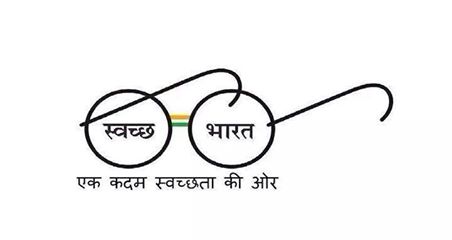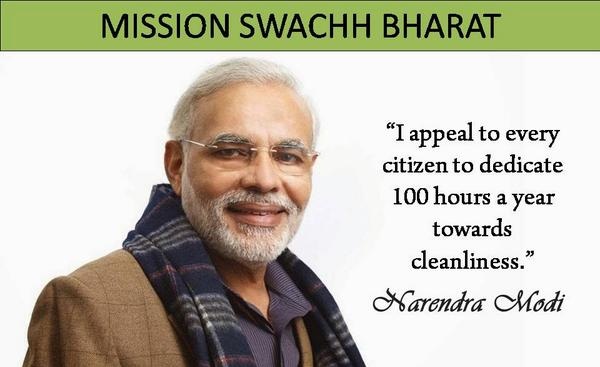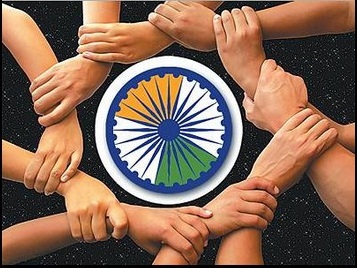Swachh Bharat Abhiyan

 Mahatma Gandhi had said that "Sanitation is more important than independence". His dream was total sanitation for all. Considering this fact in mind, the present Government of India wants to fulfil his dream and usher a clean India by 2019, which will mark the 150th birth anniversary of Mahatma Gandhi. The concept of Swachh Bharat includes cleaning of roads, pavements, and clearing of encroachments in unauthorised areas. Above all, the project aims at creating awareness among people about the need for proper sanitation and hygienic facilities. Prime Minister Narendra Modi launched this country's biggest ever cleanliness drive on Mahatma's Gandhi's birth anniversary on 2nd October 2014.
Mahatma Gandhi had said that "Sanitation is more important than independence". His dream was total sanitation for all. Considering this fact in mind, the present Government of India wants to fulfil his dream and usher a clean India by 2019, which will mark the 150th birth anniversary of Mahatma Gandhi. The concept of Swachh Bharat includes cleaning of roads, pavements, and clearing of encroachments in unauthorised areas. Above all, the project aims at creating awareness among people about the need for proper sanitation and hygienic facilities. Prime Minister Narendra Modi launched this country's biggest ever cleanliness drive on Mahatma's Gandhi's birth anniversary on 2nd October 2014.
Why this project started?
India has a massive problem of open defecation. A UN report in May had said that currently, nearly 60 percent of India's population practices open defecation. This 60 percent is roughly 58% of the people who practise open defecation all over the world. This has led to various other problems like untimely deaths of children, spread of infections and diseases and most importantly rape of young girls who go to deserted places to relieve themselves. India loses at least 1000 children a day to diarrhoeal deaths. World Bank report in 2006 said that India losses 6.4 percent of GDP annually because of the aforementioned reason.
Considering this problem, the then UPA Government had launched Nirmal Bharat Abhiyan in 1999 targeting household sanitation coverage by 2012. However, the Nirmal Bharat Abhiyan could not achieve its objectives. Nirmal Bharat Abhiyan has now been restructured by the present Government as "Swachh Bharat Abhiyan". UNICEF hailed Prime Minister Narendra Modi’s ambitious Swachh Bharat mission and offered its support to the government to successfully implement the programme, particularly in rural India.
Efforts by Government:

 For proper execution of the Swachh Bharat Abhiyan, a 19-member expert team has been formed under the chairmanship of scientist Raghunath Anant Mashelkar, former director general of the Council of Scientific and Industrial Research (CSIR). The entire team will be involved to suggest the best and the most advanced technology to provide sanitation and water facilities.
For proper execution of the Swachh Bharat Abhiyan, a 19-member expert team has been formed under the chairmanship of scientist Raghunath Anant Mashelkar, former director general of the Council of Scientific and Industrial Research (CSIR). The entire team will be involved to suggest the best and the most advanced technology to provide sanitation and water facilities.
Prime Minister has been actively supported by his cabinet ministers. The Prime Minister invited nine public figures: Mridula Sinha, Sachin Tendulkar, Baba Ramdev, Shashi Tharoor, Anil Ambani, Kamal Hasan, Salman Khan, Priyanka Chopra and Team Tarak Mehta ka Oolta Chashma – to make a contribution towards Swachh Bharat, share the same on social media, and invite nine other people to do the same, hence forming a chain. He urged people to share their contributions on social media using the hash-tag #MyCleanIndia. Some states have also participated in this cleaning campaign and more plans and programs are in the process to make this a success.
Implementation of Project:
The overall project cost has been estimated at Rs 1,96,009 crore. This amount will help in construction of 12 crore toilets across the country. The "Swachh Bharat Abhiyan" has two sub missions:
- Swachh Bharat Abhiyan (rural)
- Swachh Bharat Abhiyan (urban)
For execution of these two sub-missions, the ministries of drinking water and sanitation and rural development will look after the affairs in rural areas and the ministry of urban development in urban areas.
For rural areas, the ministry of rural development will provide Rs 20 lakh to all villages every year for the next five years. An estimated Rs 1,34,000 crore will be spent by the Ministry of Drinking Water and Sanitation for the programme. For the urban sector, the aim is to provide individual household toilets, community and public toilets, including solid waste management, covering 1.04 crore households in all 4,041 statutory towns. In areas, where there are problems of constructing individual household toilets, community toilets will be constructed. The urban development ministry has allocated Rs 62,000 crore for this project.
Challenges:
According to Central Pollution Control Board (CPCB), Urban India generates about 47 million tonnes of solid waste every year. Recycling solid waste is a big problem. These issues need to be addressed now, so that a major crisis can be prevented in the future.
While Prime Minister's Swachh Bharat Abhiyan has been highly acclaimed by many in India and abroad, there are still controversies involved in the mission. Similar programmes were launched earlier with little or no success, the most evident example being Nirmal Bharat Abhiyan. Controversies have come up because this programme too has more or less same ideas that were under UPA's Nirmal Bharat schemes.
Online Monitoring:

 The Ministry of Urban Development is in process of putting a Management Information Systems (MIS) enabling the Prime Minister’s Office (PMO) to monitor various activities under the ‘Swachh Bharat Abhiyan’. All states and other urban habitations covered under this mission will have to regularly upload information on the progress of work regarding construction of household, public and community toilets and other awareness activities.
The Ministry of Urban Development is in process of putting a Management Information Systems (MIS) enabling the Prime Minister’s Office (PMO) to monitor various activities under the ‘Swachh Bharat Abhiyan’. All states and other urban habitations covered under this mission will have to regularly upload information on the progress of work regarding construction of household, public and community toilets and other awareness activities.
Conclusion:
The Swachh Bharat Abhiyan, aimed at realising the thought that cleanliness is next to godliness, is a wonderful idea. The Centre will soon launch an intensive information, education and communication (IEC) campaign at an estimated cost of Rs 1,800 crore to generate awareness about the need for cleanliness and to bring about much-needed behavioural changes for achieving the goal of 'Swachh Bharat Abhiyan'. Corporate firms are lining up to join the Swachh Bharat Abhiyan, particularly those whose businesses are related to health and hygiene.
Swachh Bharat Abhiyan is an exciting initiative at an opportune time. As India poises itself for "big change" in the next 15 years, it is the perfect message for all its citizens: That they can look like a progressive society. Cleaner villages and cities will immediately instil confidence and pride in its dweller. Mere launching a program may not be enough; ultimate success of this campaign lies in people's participation in tandem with the government.
Sources:
Dera Sachcha Sauda, FCI join Swachh Bharat Abhiyan
Union HRD Minister addresses the Conference on the use of CSR Funds for construction of school toilets
Swachh Bharat Abhiyan: Making India Clean, & More
Swachh Bharat Abhiyan
PM launches Swachh Bharat Abhiyaan
UNICEF offers support to PM Modi's Clean India Mission
Soon, Rs 1,800 crore awareness campaign under 'Swachh Bharat Abhiyan'
PMO to monitor ‘Swachh Bharat Abhiyan’ online
Online Tracking System for Swachh Abhiyan in Process
About Swachh Bharat Mission
Clean India: 9 reasons why Modi's Swachh Bharat Abhiyan is need of the hour
Swachh Bharat Abhiyan: The spatial politics of subtraction in India
Corporate firm cleans railway premises in Mangalore under Swachh Bharat Abhiyan
Cover Image: http://www.freedigitalphotos.net Contributor: vectorolie
Cover Image: http://www.freedigitalphotos.net Contributor: franky242
Cover Image: http://www.freedigitalphotos.net Contributor: winnond